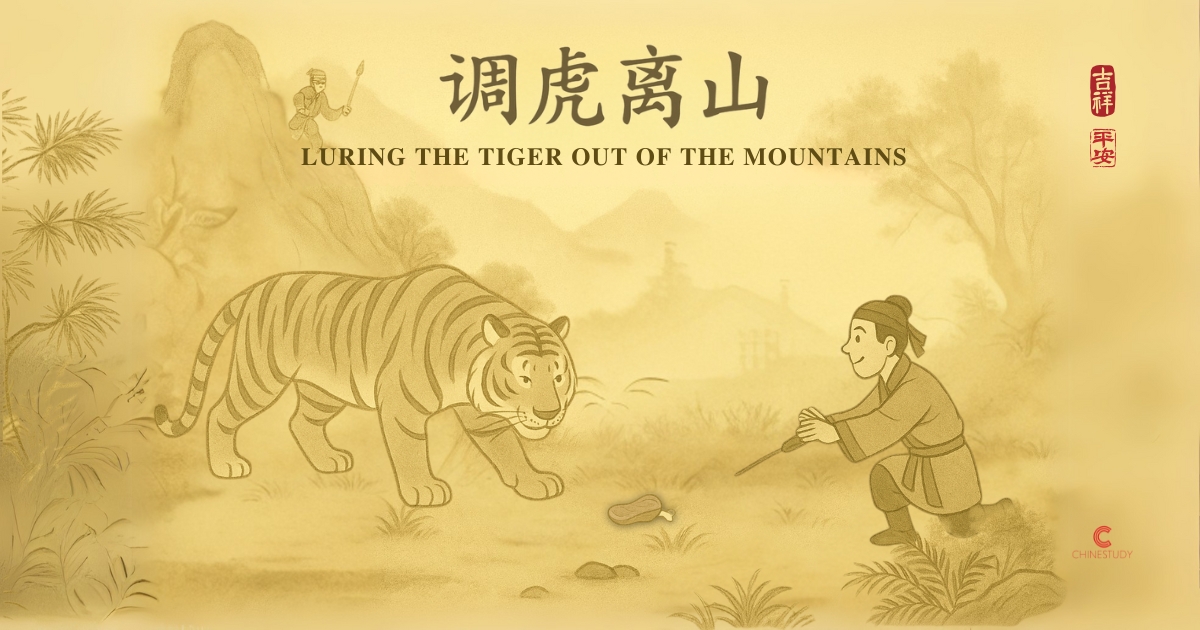🐅 调虎离山 diào hǔ lí shān – Luring the Tiger Out of the Mountains

🔍 What It Means
调虎离山 (diào hǔ lí shān) literally means “to lure the tiger away from the mountain.”
Word-for-word:
- 调 (diào) – to lure or trick
- 虎 (hǔ) – tiger
- 离 (lí) – to leave
- 山 (shān) – mountain
This idiom describes a clever strategy to draw a powerful person or threat away from their strong position — so they no longer interfere.
In English, it’s like saying:
- 🪤 “Lure the threat away”
- 🧠 “Remove the obstacle before taking action”
- 🎯 “Make room to act by drawing power aside”
🏺 Where It Comes From
This idiom comes from ancient Chinese military thinking.
A tiger is dangerous when it guards its home on the mountain.
But if it can be tricked into leaving, it becomes easier to act safely without being attacked or blocked.
The idea is not to fight the tiger — but to move it aside, so one can take action without risk.
That became a metaphor:
When someone or something is too strong to face directly, create space by leading it away.
💬 How to Use It
Use 调虎离山 when describing a clever plan to remove a strong threat or obstacle so that action can be taken more safely or easily.
- ✅ Often used in strategies, business, politics, or even daily situations
- ✅ Emphasizes removing interference — not direct attack
🎯 Real Examples
1. 他故意找她谈话,其实是想调虎离山,让我们没有防备。
- Tā gùyì zhǎo tā tánhuà, qíshí shì xiǎng diào hǔ lí shān, ràng wǒmen méiyǒu fángbèi.
- 👉 He started talking to her just to lure her away — so we’d lower our guard.
2. 他们用调虎离山之计,把反对声音暂时引开,顺利通过了决定。
- Tāmen yòng diào hǔ lí shān zhī jì, bǎ fǎnduì shēngyīn zànshí yǐnkāi, shùnlì tōngguò le juédìng.
- 👉 They used a “lure away” strategy to shift the opposition aside and smoothly pass the decision.
⚠️ Common Mistakes (Watch Out!)
❌ Mistake: Thinking it means to confront the tiger
✅ Correct: It means to remove a threat from its stronghold, not to confront it directly
❌ Mistake: Using it for general distractions
✅ Correct: It’s a strategic move to make space for safe action
💡 Memory Tip

Imagine a fierce tiger guarding its mountain — strong, dangerous, impossible to face directly.
But if someone tricks the tiger into leaving… the path becomes safe.
That’s 调虎离山 — not about attack, but about removing power to create opportunity.
🧩 Interactive Practice
Translate this sentence into English:
- 他只是想调虎离山,不是真的要帮忙。
Answer:
He just wanted to lure the strong one away — he didn’t really want to help.
🌟 Final Thoughts
调虎离山 teaches us that sometimes the smart move is not to confront power —
but to quietly shift it aside and create space to move forward.
☝️ Ask yourself: Am I stuck because I’m confronting strength — or could I shift the situation instead?
👉 Stay tuned for the next idiom in this series!
Thank you for subscribing!
Have a great day!